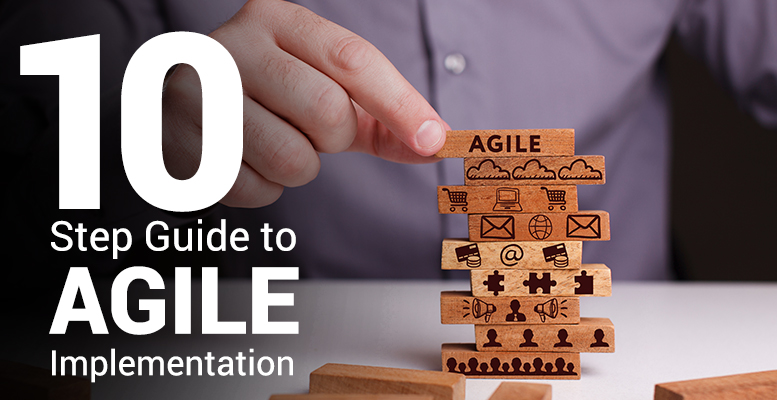Your 10-step guide to Agile Implementation

Not sure how to go about with your first Agile project? This article is a step-by-step guide.
Agile is all about speed and efficiency, a must-have in today’s dynamic business landscape. It combines the best practices and proven approaches to accelerate software development and optimize project management.
In our previous articles in the Agile series, we looked at how Agile helps modern-day enterprises stay ahead in a competitive environment and what are the various Agile methodologies that have developed over the years.
Due to its many benefits, companies across the globe are waking up to the need for embracing Agile for their software development and project management needs. Although it is simply about putting together the best practices, getting started with Agile could sound a bit overwhelming. This article takes you through a step-by-step Agile implementation roadmap making Agile adoption a cakewalk for you and your team.
1. Determine your Agile Readiness
Before you get started with your first Agile project, evaluate the readiness to implement Agile in your organization. Is Agile suitable for the upcoming project? Is your team willing to accept the change and adopt Agile? Is your client happy with an Agile-based project? A clear understanding of Agile readiness will help you chalk out a meaningful roadmap for implementation.
2. Pick the right methodology
Several Agile methodologies have sprung up to meet diverse project requirements and are widely being applied. Some of the most popular Agile frameworks are Scrum, XP, Kanban, Crystal etc. Although all Agile methodologies focus on speed, flexibility, quality and efficiency, each one has a slightly different approach. While Scrum emphasizes on changing client demands, XP aims at delivering best quality product. Pick a methodology that best suits your project demands.
3. Appoint a project manager
Agile project management is slightly different from traditional project management. Traditional projects follow a hierarchy where the team follows the roles and responsibilities assigned by the manager. However, Agile involves active participation of all team members in decision making and implementation, while the manager acts more like a facilitator of the project. Appoint a manager who understands the nature of Agile well and would help the team get through the project successfully.
4. Plan the Sprints
Most Agile projects are carried out in phases, each phase known as a Sprint. Activities are divided into small tasks to be finished within Sprints and the duration of each Sprint may vary from 15 days to 30 days. Before starting product development, gather your team and plan each Sprint, clearly defining the activities to be accomplished in each Sprint. It establishes clarity and sets standards to be met.
5. Define roles and responsibilities
Agile is all about achieving efficiency and delivering high quality results. While planning your Sprints, it is important to assign appropriate roles and responsibilities to each team member, based on individual competence and expertise. This reduces confusion and ensures that each member works to their fullest potential. Also, each member should be well aware of what is expected out of them and can focus on their core activity, thus achieving greater productivity.
6. Keep track of progress
The best part about an Agile-based project is the fact that each step in the product development journey is constantly monitored to ensure things are on track. To ensure successful accomplishment of your project, create a quick checklist, identify errors and fix them immediately before you move on to the next stage. Continuous monitoring and improvisation through the project ensures high quality end results.
7. Involve client in the process
One of the key features of Agile is that it involves active client participation in each stage of product development. As you move along, keep your client informed about the progress; get feedback and improvise accordingly. This ensures that changing client requirements are immediately and effectively addressed, leading to enhanced customer satisfaction.
8. Test the product
Although Agile teams constantly test the product throughout the development process, it is important to test the product thoroughly before it is released. This final testing includes a full system and end-user testing, and fixing any outstanding defects before the release.
9. Release the product
This is what it all boils down to; the release of the finished product. Once the software or application is complete and ready for release, it is a good practice to gather your team and plan the release effectively. Write an in-depth release plan with instructions on how and when the product will be released to the end-user. Follow this standard release plan and launch your product in the market.
10. Extend support services
Once you’ve successfully released the product, the project is nearly complete. However, there are some post-development tasks that need to be carried out. It could mean spending some time with the client or end-user, training and assisting them with the new product usage, fixing issues and enabling a smooth transition.
Agile is spreading widely and gaining huge momentum in software development. Several businesses have already adopted Agile and are seeing better results. Follow this 10-step road map to implement Agile effortlessly in your next project.

